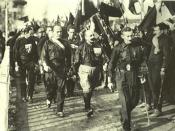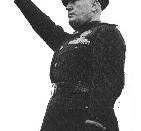The aftermath of the First Wold War saw the foundation of the fascio di Combattimento on March 23rd 1919 in Italy. This party, headed by Benito Mussolini was not particularly popular in its early years. No seats were won in the 1919 elections and Mussolini only held 2% of the vote in Milan. Yet in 1922, Mussolini became Prime minister of Italy following the "March on Rome". What followed was two decades of unilateral rule by Mussolini, who despite having come to power "democratically", exerted an iron grip rule over Italy. AJP Taylor once described him as "a vain blundering boaster without either ideas or aims." Was he really "vain, boastful and blundering", or is this assessment too harsh?
In order to gain power, Mussolini "applied all his journalistic skills and tricks to attract popular attention and support." (Lee, p.108, 2000) D'annunzio's Fiume escapade taught him how to create a sense of power among his followers, even incorporating the war cry of the Arditi ("Ayah, ayah, alala!" (Lee, p.109,
2000)) in his Fascist movement. According to Hibbert (1964 cited Lee 2000), his personal attributes included "a physical stance not yet devitalised by illness, a style of oratory, staccato, tautophonic and responsive, not yet ridiculed by caricature and a personal charm not yet atrophied by adulation." "With this presence, he was able to act his way into power." (Lee, p.109, 2000) And this is what happened. Mussolini made it appear as if Fascism had the strength to destroy socialism and remould society. No chances were subsequently taken by politicians and "Mussolini was given more respect than his strength perhaps deserved" (Lee, p.109, 2000) which would certainly explain the capitulation of Facta and the king when threatened in 1922. "This personification of power had inherent dangers as, eventually, the bluff turned inwards"...


